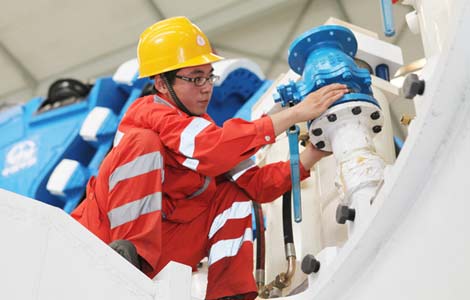Nation faces huge challenges ahead
Updated: 2013-06-17 07:36
By Ed Zhang (China Daily)
|
||||||||
The Chinese stock markets reacted impatiently after the Dragon Boat Festival (Monday through Wednesday) to the changes in the outside world or, to put it another way, a lack of changes inside the country.
Many business figures are weak, although officials say things are under control and the figures don't suggest immediate danger. But words abound in Beijing that such and such a government agency will soon (at various points within the year) roll out a new reform program. This in itself does reflect officials' understanding that the economy cannot proceed as it is. Something has to be done soon enough to buttress the market's confidence.
It is not a matter of to do or not to do, but what to do. Both inside and outside China, investors are whispering about what will be the next move Beijing will take.

Before the answer becomes clear, it looks likely the markets will continue to hover around a low level, say between 2100 and 2300 on the Shanghai Composite Index.
Of course, changes don't usually happen as fast as people wish. One has a good reason to argue that more patience is needed, considering the fact that China's new cabinet was formed only three months ago and that reform initiatives have been sparse as the economy rode comfortably on the crest of globalization in the previous decade.
But this is precisely why investors are expecting some new impetus. One of the problems with China's past export-led and foreign direct investment-powered growth model was to encourage its players to assume they just had to invest more money and produce more goods to become a world-level strong economy.
At one time, the belief that China has (or its residents have) money and can do anything was unbiquitous, particularly in the heyday of the previous cabinet's much touted 4 trillion yuan ($653 billion) stimulus program, mainly using State-owned enterprises to support the economy's growth rate when the United States and Europe were in financial crisis.
Now the pendulum is moving in another direction. As the US economy is showing some signs of recovery and the Federal Reserve is likely to fold its easy credit program, China will be faced by not just a slowdown in growth, but possibly a more complicated situation.
International hot money, once flowing into China to benefit from the rising value of the yuan, will be directed to higher returns in other markets.
Wealthy Chinese would also want to jump on the bandwagon. The patience of portfolio investors would run out with the up-to-now piecemeal regulatory reform of the domestic stock markets.
Long-term capital commitment, in terms of FDI and direct investment from domestic companies, would find the country no longer as attractive as it once was with its abundant supply of inexpensive labor and a rapidly growing retail industry.
Large amounts of money will be needed for urbanization and related various social programs.
More seriously, debt has witnessed an unprecedented rise, incurred by both local governments, with their ambitious but not necessarily well-managed and productive public building projects, and by corporate and private borrowers.
These factors combined will create a huge drain on capital and credit-worthiness backed by good assets. At this point, it is useless to talk about the possible market index scenarios, or to speculate whether the country would be able to keep its annual GDP growth above 7 percent, or to dwell on the price tag of each of the above items.

 7 injured at Beckham event
7 injured at Beckham event
 A science class from above Earth
A science class from above Earth
 Chinese telecom companies call on Myanmar
Chinese telecom companies call on Myanmar
 June PMI signals weakness
June PMI signals weakness
 Rising demand sends producers overseas
Rising demand sends producers overseas
 Michelle lays roses at site along Berlin Wall
Michelle lays roses at site along Berlin Wall
 Historic space lecture in Tiangong-1 commences
Historic space lecture in Tiangong-1 commences
 'Sopranos' Star James Gandolfini dead at 51
'Sopranos' Star James Gandolfini dead at 51
Most Viewed
Editor's Picks

|

|

|

|

|

|
Today's Top News
China urges resumption of six-party talks
SEC charges China-based firm with fraud
Bank of China denies monetary default report
Snowden's future hangs in balance
China reiterates support for the UN
Dairy measures start at source
June PMI signals weakness
Drug-related crimes on the rise in Xinjiang
US Weekly

|

|







